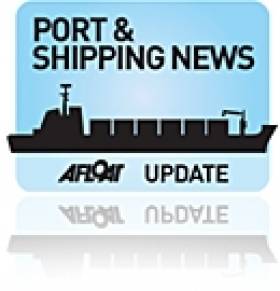Displaying items by tag: Guinness barges
Remembering the Last Guinness Barge, 60 Years On
Waterways enthusiasts have marked 60 years since the last working journey of Guinness barges in Dublin with a short video tribute.
Derek Whelan of the Inland Waterways Association of Ireland (IWAI) gives a brief history of the barges, which once plied the River Liffey between the St James’ Gate brewery and Custom House Quay, from where ships would sail laden with stout for the UK.
Barges ferried barrels for export in this manner from 1874 to 23 June 1961 when the last barge, the Castleknock, departed from the Guinness jetty at Victoria Quay with its precious cargo.
Arthur's Day: Time to Reflect the Last Guinness Ships
The Lady Patricia represented the last of the more traditional Guinness vessels, though her predecessors The Lady Grania and The Lady Gwendolen differred in that they had split superstructures with the bridge admidships and accommodation quarters placed aft. Whereas The Lady Patricia had her superstructure positioned well aft.
In addition she was the last to carry a 'Lady' prefix name. She was named after the daughter of Lord Iveagh, Rupert Guinness, when entering service in 1962 from the yard of Charles Hill & Sons, Bristol. Her entry allowed the Guinness to be eventually replaced when she went to be scrapped at Faslane the following year.
Two deck-mounted granes that were used to hoist silver cylinders containing the beer where removed in 1973 from The Lady Patricia when she was converted into the world's first beer-tanker. The new method no longer required the cumbersome and time-consuming process of loading barrels from trucks. Instead trucks fitted with tanks transferred the liquid-cargo through pipes which involved pumped some 205,000 gallons or 1.87 million pints on board.
Unlike The Lady Patricia which was converted for tanker operations, the Miranda Guinness became the world's first custom-built beer-tanker when launched in 1976 from the Albion Shipyard also in Bristol. She also represented the last vessel to be launched (see PHOTO) there, after 156 years of shipbuilding.
Miranda Guinness was named by the Countess of Iveagh, after whom she was named. The newbuild replaced both The Lady Grania and The Lady Gwendolen which were sold. Since their launch The Lady Patricia and Miranda Guinness were registered in Liverpool until 1987 when the port of registry became Dublin. This arose following a change in the vessels management to Irish Marine Services Ltd, which was made up of former Irish Shipping Ltd management.
This arrangement only lasted to 1993 when Guinness discontinued the world's only beer-tanker shipping operation on the route linking Ireland and Britain. The process had allowed millions of pints to be served through the use of conveying the 'black-stuff' on board the dedicated beer-tankers or should that be those stout ships! Of the two vessels, the Miranda Guinness was the last to depart Dublin Port.
The ships were sold for scrapping on Merseyside and replaced in the form of 20-foot transportable tank trailers towed by trucks using Irish Sea ferry routes. Each of the silver tankers holds 10,000 gallons which is equivilant to 80,000 pints. It would take someone drinking 10 pints a day 22 years to drink it! Now that would be another challenge for the famous Guinness Book of Records!
In addition as we approach 17:59hrs, reflecting the 1759 date of the lease signing by Arthur Guinness, perhaps that minute could also be used to reflect a unique era in Irish brewing transportation methods and shipping history. By the way, Cheers to Arthur!
- River Liffey
- Ports and Shipping News
- Sir John Rogersons Quay
- Irish Shipping Ltd
- Guinness
- Guinness barges
- The Last Guinness Ships
- Arthur's Day
- The Lady Patricia
- Miranda Guinness
- Stout Ships
- Beer tankers
- Runcorn
- Manchester Ship Canal
- St. James Gate
- Stouttankers
- Charles Hiil & Sons Bristol
- Irish Marine Services Ltd
- Salford Docks
- Guinness concentrate
- Albion Shipyard Bristol
Heritage Week: Maritime Lectures In Dun Laoghaire
12.30 – 1.30 pm. Neutral Ireland's Role in the Sinking of the Bismarck, May, 1941 By Dr. Michael Kennedy, Executive Editor, Documents on Irish Foreign Policy, Royal Irish Academy.
1.30 – 2.30 pm. Traditional Boats of Ireland. - Wooden workboats from all the Maritime Counties of Ireland. By Darina Tully, Lecturer and Maritime Archaeologist.
2.30 – 3.30 pm. Too Many Bags in the Lifeboat. A Lifeboat Tragedy at Bray 1876 By James Scannell, Lecturer and P.R.O of the Old Dublin Society.
4.00 – 5.00 pm. Maritime Guinness, The Ships, Yachts and Barges of the Guinness Dynasty. By Dr. Edward Bourke, Diver, Maritime Historian and Author of "Guinness, the Family, the Business and the Black Stuff"
5.00 – 6.00 pm. Ireland's Armada Heritage. The Story of the Spanish Armada of 1588. The discoveries of the wrecks on the Irish Coast and the recovery of artifacts. By Cormac Lowth, Lecturer, Author and Diver.
Further information Barney Yourell 087 900 7466 No seminar charge – donations accepted. Information in general on the Maritime Institute of Ireland can be found on http://www.mariner.ieand for other nationwide events of the Heritage Week visit www.heritageweek.ie
- Events
- Dun Laoghaire Harbour
- M.I.I.
- Dun Laoghaire Harbour News
- Event news
- National Heritage Week
- Heritage Week
- Maritime Lecture Seminar
- Spanish Armada
- Eblana Centre Dun Laoghaire
- Maritime Insitute of Ireland
- Bismarck
- Traditional Irish wooden boats
- Guiness ships
- Guinness barges
- Darina Tully
- Irish heritage boats

























































